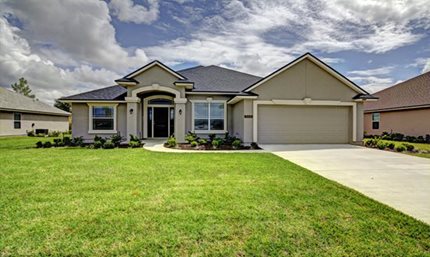News & Tips
30-year Fixed-rate vs. 15-year Fixed-rate (+ How to Decide Between the Two)

Today in the ring: 30-year fixed-rate mortgage vs. 15-year fixed-rate mortgage. In this article, we’re going to cover the pros and cons of each mortgage term to help you make a more informed decision. And along the way, we’ll provide some helpful tips to keep in mind. In the end, you’ll have a better idea of which one will better suit your needs on the path to homeownership. And if you’d like to explore other home loan options, SCCU offers a wide spectrum of conventional loans that you can see here.
What is a 30-year fixed-rate mortgage?
A 30-year fixed-rate mortgage means that the borrower will have paid off their home loan in 30 years. Fixed-rate mortgage locks in an interest rate, and the monthly payments are the same throughout the life of the loan. With an adjustable-rate mortgage, the interest rate fluctuates, so the monthly payments are subject to change. A longer mortgage means the monthly payments are lower, so this is a popular option. In fact, around 90 percent of home purchase mortgages are 30-year loans.
Advantages of a 30-year Fixed-rate Mortgage
- Getting lower monthly payments: The majority of people gravitate towards this type of loan for this very reason. It’s simply more affordable than other types of mortgage loans. And because it’s a fixed rate, it’s easier to budget for this expense every month. Borrowers also have more money available every month for other expenses, emergencies, savings, and investments.
- Qualifying for a more expensive home: Because the monthly payments for a 30-year mortgage are lower, it’s not as difficult to qualify for a significant home loan amount. (However, a larger mortgage comes with the downside of acquiring more debt.)
Disadvantages of a 30-year Fixed-rate Mortgage
- Paying a higher interest rate: The longer the loan, the higher the risk exposure. Therefore, this loan comes with a higher interest rate than with a 15-year mortgage. And as you’ve probably already guessed, a higher interest rate means paying more money overall for the life of a loan. In fact, a 30-year mortgage typically costs 2.2X more in interest than a 15-year mortgage of a home with the same principal amount.
- Owning the home in 30 years: Of course, the biggest downside of this mortgage term is the amount of time it takes to truly call the home yours. However, as long as there are no pre-payment penalties, you can put more money towards the mortgage payments whenever you’d like.
- Building equity at a slower rate: With this type of loan, it’d ultimately take longer to be able to tap into your equity for other large expenses.
Helpful tip: For those months you get an extra paycheck, consider putting some of it towards your mortgage; one additional mortgage payment a year can reduce the life of the loan by a couple of years and save you thousands of dollars in interest!
What is a 15-year fixed-rate mortgage?
A 15-year fixed-rate mortgage means that the entire loan will be paid off in half the time of a 30-year mortgage, assuming the borrower makes all the payments on schedule. However, less than 10 percent of home purchase mortgages are 15-year mortgages, so it's not a popular option. Because it involves higher monthly payments, this can be a more difficult loan to obtain for first-time homebuyers.
Advantages of a 15-year Fixed-rate Mortgage
- Saving more money: Because the life of the loan is shorter, it doesn’t pose as much of a risk to a lender as a 30-year fixed-rate mortgage. So, the interest rate is always lower, usually by about a quarter to whole percentage point. With a lower interest rate and fewer payments, homeowners put more money towards the principal faster and save thousands of dollars.
- Owning the home in a shorter time: One of the best advantages of a 15-year fixed-rate mortgage is that you can call the home yours in just a decade and a half. For those approaching retirement, having the house paid off would be a big relief because it’ll free up cash for other monthly necessities on a smaller fixed income. Also, with this debt paid off, it makes it easier to refinance on other loans because you’ll have a lower debt-to-income ratio.
- Building equity at a faster rate: Another appealing benefit of this type of mortgage is that a shorter term means more equity, which means a higher profit when selling. If you don’t plan on selling any soon, you can cash out on this equity for expenses like college tuition, home renovations, and investment opportunities.
Disadvantages of a 15-year Fixed-rate Mortgage
- Making larger monthly payments: Unfortunately, a shorter loan means higher monthly payments. And with the additional expenses for home insurance, property taxes, and possibly mortgage insurance with less than 20 percent down, this large expense may not be feasible for many borrowers. Also, this type of loan can result in a higher debt-to-income ratio for the borrower, which could make it more difficult to qualify for other loans.
- Having little extra cash flow: The higher monthly payments often means the borrower will have less cash available to save for retirement, college tuition, and emergencies. It could also entail making sacrifices for treats and activities due to having a tighter budget. If the homeowner’s income is often subject to change, this may not be a good option.
Helpful tip: If you’re truly interested in a 15-year mortgage, a larger down payment from the get-go can help reduce the size of the monthly payments.
15- and 30-year Mortgage Rates
Let’s take a look at the difference in monthly payments and total interest between the two terms using our mortgage calculator for a home valued at $350,000:
- 30-year fixed-rate mortgage:
- Example Rate: 3.125 percent
- Down payment: 3 percent
- Monthly payment: $1,454.33
- Total paid in interest: $184,061.61
- 15-year fixed-rate mortgage:
- Example Rate: 2.625 percent
- Down payment: 3 percent
- Monthly payment: $2,283.78
- Total paid in interest: $71,580.63 — A savings of over $112,000!
| Term | Rate "As Low As" | APR* "As Low As" | Example Loan Amount | Example Monthly Payment |
|---|---|---|---|---|
| 10 Years - Purchase or Refi | 5.125% | 5.326% | $300,000 | $3,200.33 |
| 15 Years - Purchase | 5.250% | 5.391% | $300,000 | $2,411.63 |
| 15 Years - Refinance | 5.375% | 5.517% | $300,000 | $2,431.40 |
| 20 Years - Purchase or Refi | 6.000% | 6.115% | $300,000 | $2,149.29 |
| 30 Years - Purchase | 6.000% | 6.086% | $300,000 | $1,798.65 |
| 30 Years - Refinance | 6.125% | 6.212% | $300,000 | $1,822.83 |
Example monthly payments do not include taxes and insurance, and the actual payment obligation will be greater.
HOME LOANS: Rates based on creditworthiness. Mortgage loans are originated by Space Coast Credit Union and are subject to credit approval, verification, and collateral evaluation. Programs, offers, rates, terms, and conditions are subject to change or cancellation without notice. Certain restrictions apply. Taxes and insurance not included; your actual payment obligation will be higher.
These mortgage loan programs constitute first mortgage liens secured by the home and property. Your down payment is determined by the Loan-to-Value ratio. (90% LTV = 10% down payment). Loans exceeding 80% of the appraised value of the home require private mortgage insurance. Member responsible for any funds needed for closing costs (unless member attached a No Closing Costs option to loan) and pre-paid escrow.
Which one is best for you: 15-year or 30-year mortgage?
When it comes right down to it, choosing between a 15-year and a 30-year mortgage depends most on what you can comfortably afford for your monthly mortgage payment.
For those who are younger, a 30-year mortgage is often a good option because it allows you to have extra cash each month to save for bigger expenses down the road. Plus, it gives you a lot more flexibility because you have the option to make extra payments toward the principal. Borrowers can also look at refinancing their loan to a shorter term with a better interest rate down the road.
However, if higher monthly payments are doable, and you’re interested in saving more money in the long run or making a decent-sized profit off the house, a 15-year mortgage is a great option.
15- vs. 30-year Mortgage Tax Savings
Some borrowers wonder if they can save more money in the long run on their tax deductions with one mortgage term over the other. With a 15-year mortgage, your interest rate would typically be lower, and the term would be shorter, so you’ll have less of an overall tax deduction than with a 30-year mortgage. However, even though the tax savings would be more with a 30-year mortgage, you’d still be saving thousands more overall in interest costs with a 15-year mortgage. Be sure to consult with your tax advisor on the changing requirements to ensure you get the maximum deductions on your home loan.
Qualifications for 15-year and 30-year Fixed-rate Mortgages
Both types of mortgages typically require borrowers to have a minimum credit score of 620 and a debt-to-income ratio of 45 percent of their gross monthly income. Some lenders offer more leeway on the debt-to-income ratio if the borrower has a higher credit score. You’ll likely also need to show a steady income and payment history.
For those buying a home the first time, you’ll need a down payment of at least 3 percent of the home’s value, and for those who are not first-time homebuyers, 5 percent of the home’s value. You can learn more about calculating your debt-to-income ratio, pulling your paperwork, getting the pre-approval, and more in our online Home Buying Center.
SCCU is Here to Help!
As a credit union, we differ greatly from banks in one primary way—we exist to serve our member-owners, not make a profit for shareholders. As such, our mortgage rates are competitively low, and we don’t charge an application fee or pre-payment penalties. We also have fast pre-approval decisions and provide member service for the life of the loan. Plus, we offer special-rate discounts for those serving the front line in our communities. If you have any questions, you’re welcome to request a consultation with us, or you can contact us in the way that’s most convenient for you—via Live Chat, WhatsApp, over the phone, or a secure message in Online Banking.
































